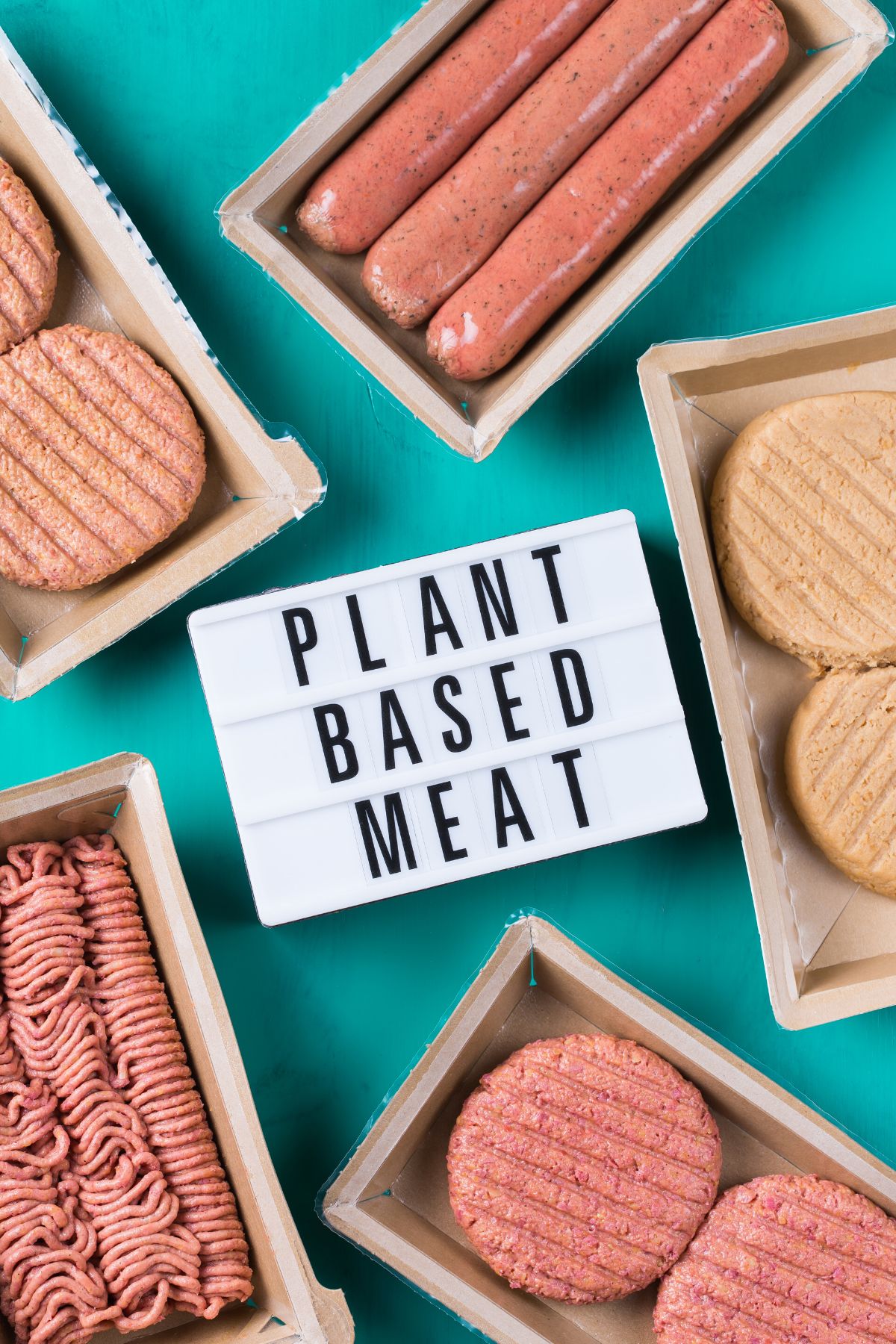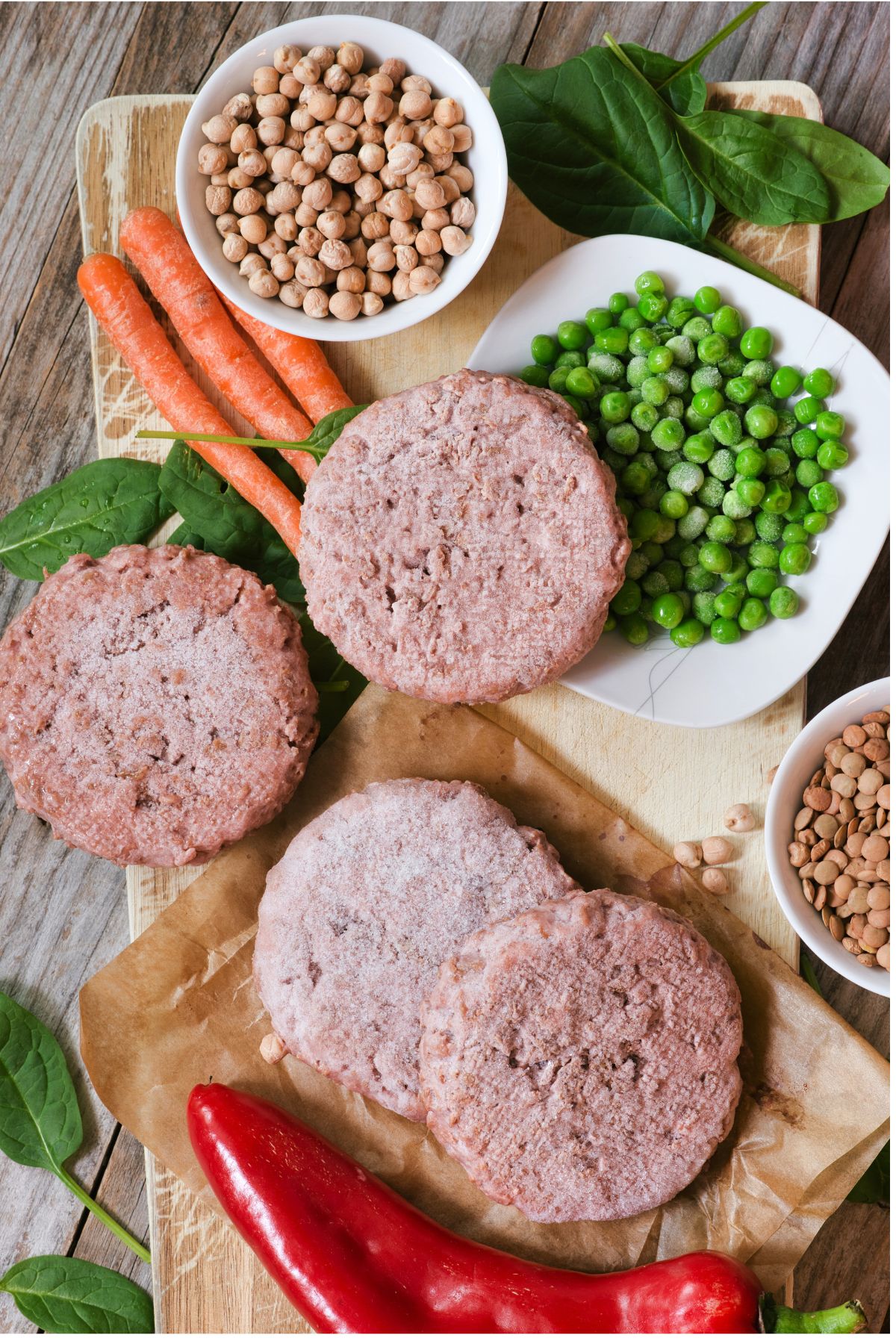5 Potential Dangers of Plant-Based Meat (What to Eat Instead)
Is fake or plant-based meat really healthier for you than real meat? Learn these 5 potential dangers of plant-based meat and what foods you should be eating instead.

What Are Plant-Based Meats?
Plant-based meat alternatives are fake meats that are alternatives to real meat, made from plant sources of protein like soy or pea protein isolate. Publicly debuted just in the last several years, plant-based meat is quickly gaining popularity among those looking to reduce their meat consumption.
Packaged plant-based meat is sold primarily in patty form or in packages similar to real meat and can be found in most major grocery stores nationwide, including specialty grocery stores like Whole Foods.
These fake meat alternatives have even been introduced at major restaurant chains like Burger King and Subway.
Plant meat is meant to offer vegans, vegetarians, and other non-meat eaters a “life-like” meat alternative. The creators of various plant based meat companies want to offer a non-meat burger that looks, bleeds, cooks, and tastes like real meat.
The creators of packaged plant-based meat want to present an easy swap to a meatless lifestyle, even ensuring that fake meat is sold alongside real meat in the pre-packaged meat section of the grocery store. The most popular offering are plant-based burgers made using these plant-based meat products.
Fake meat also offers a similar macronutrient ratio to real meat, advertising 20 grams of plant protein per serving as an answer to the perennial “vegetarian protein” debate (a 4 ounce serving of beef offers about 21 grams of protein, for comparison).
Everything about plant-based meat is intended to serve as a replacement for real meat made from animals. They are marketed mostly to people on a plant-based diet who are trying to avoid eating animal products and the supposed chronic diseases associated with them (see why how this theory has been debunked).
Fake Meat Brands
As of 2019, there are several major fake meat brands competing in the marketplace. There is the Impossible Burger from Impossible Foods and the Beyond Burger which are both sold in major retailers and restaurants nationwide.
Plant-based meat is a burgeoning industry, with several other brands likely to make their appearance in the near future. Even major meat producers like Tyson are planning to launch plant-based alternatives.
Nutrition Debate
The healthfulness of processed fake meat is heavily debated. Proponents claim it offers a healthier version of meat due to its slightly lower caloric load, while opponents are skeptical of its processed ingredients.
A serving of fake meat has around 250 calories, a minor decrease compared to the 290 calories in a serving of real meat. Aside from this slight caloric difference, fake meat and real meat have similar macronutrient ratios.
Given that the caloric difference is a mere forty calories, proposing plant-based meat as healthier than real meat based on caloric load alone is not valid. This caloric difference doesn’t even account for the caloric load of lean beef, which comes in at only 200 calories.
Moreover, caloric load is not an indicator of a food’s healthfulness. Instead, a food’s healthfulness can be determined by its nutrient density. 250 calories of processed food does very different things to your body than 250 calories of whole food.
While real ground beef will supply you with necessary bioavailable B vitamins, iron, zinc, selenium, cholesterol, and saturated fat, Beyond Meat offers none of these vital nutrients except for iron (in the form of non-heme iron, the less bioavailable version of iron).
The Impossible Burger offers high levels of certain B vitamins, though these nutrients are synthetically added during production.

5 Dangers of Plant Based Meat
While I understand the environmental and ethical reasons around moving away from confined animal feeding operations (CAFOs), the bottom line is that processed plant-based meat is not the answer.
The damage to human health from this ultra-processed food could possibly do the same harm or even more harm than factory-farmed animal meat.
Fake meat cannot replace nutrient-dense real meat. Here are five reasons to reach for your real burger or a bean burger instead.
You may also want to read my articles on the dangers of a vegan diet and why I stopped being vegan.
1. It is ultra-processed
Fake meat is not a whole food. It is a processed conglomeration of already-processed ingredients.
The major ingredient in the Beyond Meat burger is pea protein isolate, a form of protein that involves stripping and processing the nutrients from peas to isolate its protein content.
The Impossible Burger boasts a protein source of soy protein concentrate–another form of protein made from processing a whole food. See more reasons why processed soy may be dangerous.
So far, the food industry has succeeded in creating ultra-processed foods to help people eat less meat. But, what are the health consequences and environment impacts of these highly processed food products?
2. It may not be gluten-free
Other than the large portion of the population underdiagnosed with Celiac disease, even more may have non-Celiac gluten intolerance or sensitivity.
Gluten is a major common allergen and can present problems even for those who can technically tolerate it. A gluten-free diet is optimal for most people so consuming processed foods like fake meat is not ideal.
Just because a food does not contain gluten-containing ingredients does not mean it is gluten-free. If it is processed on shared equipment with products containing wheat gluten, it likely has trace amounts of gluten.
Consuming fake meat could be downright dangerous for those with serious gluten sensitivities, as there is no brand of fake meat that is certified gluten-free at this point.
3. Fake meat is not real food
Fake meat is unrecognizable to our bodies. Heavily processed ingredients like pea protein isolate, soy protein concentrate, yeast extract, canola oil, natural flavors, potassium chloride, dextrose, and synthetic vitamins are not usable by our bodies.
We’re not evolved to properly digest and obtain nutrients from these processed ingredients and chemicals. Whole foods offer bioavailable nutrients that work synergistically in your body. For all of these reasons, fake meats are one of the worst foods for the environment.
Stick with a diet rich in whole, real foods from the earth and the pasture to supply your body with the nutrients and fuel it deserves.
See my list of clean eating foods or you may also want to check out my list of the best gluten-free vegan recipes if you are following a plant-based approach.
You would be so much better off eating a homemade lentil burger made from real plant-based foods or grass-fed beef burgers instead of the fake stuff (see my guide on where to find grass-fed beef).
See my recipe for Air Fryer Hamburgers made without breadcrumbs.
4. Fake meat does not have good nutrition value
Fake meat cannot compete with real meat in terms of nutrition. Fake meat is high in sodium, containing at least 16% of your daily requirements (the Impossible Burger and the Beyond Meat burger sodium content.)
Real meat contains only 4% of your daily value of sodium, in comparison. Fake meat is low in overall nutrition. The Beyond Meat burger offers almost no vitamins and minerals, while the nutrients in the Impossible Burger are synthetic.
5. It might make you sick
Our bodies cannot function optimally when we feed them heavily processed, nutrient-stripped foods instead of real, nutrient-dense foods. We are designed to eat plants and meat, not factory-processed products.
Your immune system may take a beating from the gut-harming ingredients like soy, pea protein, canola oil, dextrose, natural flavors, and sunflower lecithin found in these fake meat products.
You’re even more at risk if you have allergies to any of these ingredients. Not to mention that none of the ingredients are certified organic or non-GMO, so you may be burdening your system with toxins.

What to Eat Instead
Instead of falling for marketing and fear-mongering, continue to prioritize real, whole foods in your diet. Here are some healthy options for including meat in your diet.
1. Choose to continue including real meat in your diet
Consumed in moderate amounts, real meat is a healthy choice in a well-rounded diet. If you want meat, choose grass-fed, grass-finished, and preferably organic. See my resource for finding grass fed beef near me.
Grass-fed and pasture-raised animals offer superior levels of nutrients and a better Omega-3/Omega-6 fatty acid ratio. Animal protein is generally a great source of essential amino acids and is superior as a protein source to any plant-based products or plant proteins.
Factory farming is good for no one, so support farmers who treat their animals ethically and raise them with proper nutrition and eco-friendly practices in mind.

2. Opt for real food sources of plant-based protein instead
While fake meat is marketed as plant-based protein, there’s very little in terms of real plants in those products. If you want a true plant-based option, try a homemade lentil burger or a bean burger!
Even the frozen ones are less processed than fake meat. Or, you can make your own very easily. Bean burgers offer nutrients, fiber, and protein.
3. Consider including only poultry and fish
Depending on your reasons for wanting to decrease or eliminate meat consumption, you may be fine with consuming poultry and fish while forgoing red meat.
Turkey or chicken burgers can be super tasty and nutritious. You can also opt for fish patties if land animals aren’t your style.
Or, go vegetarian and only consume dairy and eggs for your animal product consumption.
Fake Meat FAQs
Yes, but you have to read the labels. Try to find packaged burgers that are made with simple ingredients like beans and grains. Avoid brands that have chemicals or isolates in the ingredient list.
It is unlikely that fake meats are better overall considering that they use highly processed ingredients and the potential negative toll on human health. Real foods grown considerably and sustainably are the best bet for both human health and the environment.
Fake meats can be expensive. But, real meat that is grass-fed and grass-finished can also be expensive. It’s best to build your diet around a whole food approach including quality proteins. What you spend at the grocery store is an investment in your overall health.
Don’t Miss These Important Nutrition Articles
Conclusions
Fake processed plant-based meat may seem like a dream come true for meat-conscious eaters, but it falls short of the hype. It is a processed product that is nutritionally inferior to real meat. Processed meats will likely continue to gain steam and be made widely available, though its high price point may stop it from being a realistic alternative for most Americans.
Even if price isn’t a big concern for you, you’re better off investing your money in ethically-raised grass-fed real meat. Your overall health will fare better with real meat or true plant-based alternatives like bean burgers.
Don’t forget to join my newsletter list to get exclusive clean eating recipes and tips. The newsletter is 100% free with no spam; unsubscribe anytime.
About the Author: Carrie Forrest has a master’s degree in public health with a specialty in nutrition and is studying to be a holistic nutritionist. She is a top wellness and food blogger with over 5 million annual visitors to her site. Carrie has an incredible story of recovery from chronic illness and is passionate about helping other women transform their health. Send her a message through her contact form.
Note: this post is for informational purposes only and is not intended as medical advice. Please consult your healthcare provider for recommendations related to your individual situation.





















I get that fake meat isnt good for you, and the vegan diet is not for everyone. Being vegan isnt about not eating meat for health reasons ( for many) it’s about not harming living beings.
Thank you so much for pulling together so many aspects of the consequences of the fake meat trend into a coherent read. I appreciate your work.
And either #6 reason or maybe a subset of #5
althealthworks.com/18866/gmo-impossible-burger-tests-positive-for-high-levels-of-cancer-causing-glyphosate-residues/
GMO Impossible Burger Tests Positive for High Levels of Monsanto’s Glyphosate
by Nick Meyer | October 8, 2019
Yes, exactly! Thanks for sharing the article!
Thank you for this very sensible information. I love it when information is simple and makes sense!